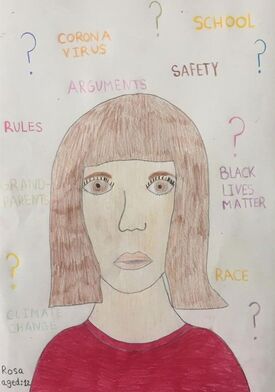|
What does this moment of uncertainty of COVID-19 signal for the future of education? The intensity and scale of the current pandemic signals the need to look at how children and young people experience uncertainties in their diverse lives. COVID-19 is the most recent of many pressing challenges. Climate change being another notable example. The current Black Lives Matter protests are also a powerful reminder that uncertainties are experienced unequally and are more acute for those living with economic precarity, vulnerabilities and discrimination. There are currently many public health messages on keeping safe and well, such as washing hands, but research by Lucy Bray and colleagues shows that it is insufficient simply to tell children to follow advice, without also exploring their difficult questions. Children and young people need opportunities for critical engagement with scientific knowledge to make sense of it in relation to their own lives — washing hands, for example, is not easy for the 2 million Americans without running water. Children, like adults, are becoming more versed in epidemiology modelling — including R values, herd immunity, and flattening curves — emphasising the need to support them to understand and tolerate that “uncertainty is the engine of science” (Prof Tom Jefferson, epidemiologist). There are now live opportunities to discuss competing and diverse disciplinary knowledge (see Louise Ryan’s blog), with the understanding that science knowledge is negotiated not fixed (see John Dupré's blog), and can be used for political ends. By deliberating different sources of knowledge and ideas, and sharing experiences, they can participate in current debates, including how to emerge from lockdown and return to school in ways that feel safe. We are currently working with a group of teachers, and Caroline Hickman (Climate Psychology Alliance) — whose work focuses on children’s emotional responses to the climate and biodiversity emergency — to explore parallels between the uncertainties (including anxieties) of climate change and COVID-19. Schools are concerned about both. We plan to open-up spaces for teachers and children to explore what it means to return to school in a context where they must adapt to an on-going shifting pandemic (and post-pandemic) context. This includes taking a moment to reflect on what we might want to continue prioritising from before lockdown, and the possibilities to create learning environments that engage children with change and unknowns, in ways that acknowledge their experiences, feelings and thoughts. We shall be using outdoor settings to ensure physical distancing, but also as a conduit for reflection, healing, and an appreciation of how our lives our interconnected, including with the natural world. The children’s author, Michael Rosen, reminds us that when faced with the perils and possibilities of adventure, ‘We can’t go over it. We can’t go under it. Oh no! We’ve got to go through it’, and that this is best done together. For children, this includes the helping hand of a trusted adult. Such supportive conditions are key to building the types of community resilience that allow for something new and exciting (if a little scary) to emerge. Acknowledging existing uncertainties, rather than ‘trying to find a way to kill uncertainty’, suggests Riel Miller from UNESCO (see BBC Radio 4’s Start the Week), is a way to appreciate novelty, diversity and difference. It offers the possibility to cultivate the confidence and imagination to explore ways to express these values in ‘radically different ways.’ Acknowledging uncertainty requires paying attention to children as they puzzle over difficult questions, those where adults — including teachers, parents, scientists and politicians — do not know the answers in advance or where things might lead. Such opportunities aim to cultivate children’s capabilities and hope to tolerate and respond to uncertainties, rather than being put-off by complexity, anxiety or futility. Wim Lambrechts and James Hindson list a range of ‘uncertainty capabilities’ under the following headings:
In education, we take children’s futures seriously, through defining the knowledge and behaviours that might enable them to lead ‘successful’ adult lives. Engaging with existing knowledge and being socialised to ‘fit in’ is important, but so too is working with the uncertainty of what is currently known or possible to do and be, and what might follow. Working with uncertainty requires adults to let go, if only for a moment, of assumptions about what will or can happen, what children know or need to know, and how children live their lives (now and in the future). Working with uncertainty requires us to pay attention to how children themselves make sense of their diverse worlds: encouraging them to draw on their experiences and what is already known, as well as to look ahead to the kinds of worlds they’d like to create. This informs how they might live well now, together with others. This engagement with uncertain futures, suggests UNESCO, offers the necessary ‘futures literacy’ skills essential for responding to the 21st century challenges. Including pandemics. And climate change. And social injustices.
1 Comment
Leave a Reply. |
AuthorPerpetua Kirby & Rebecca Webb Archives
November 2023
Categories |

 RSS Feed
RSS Feed